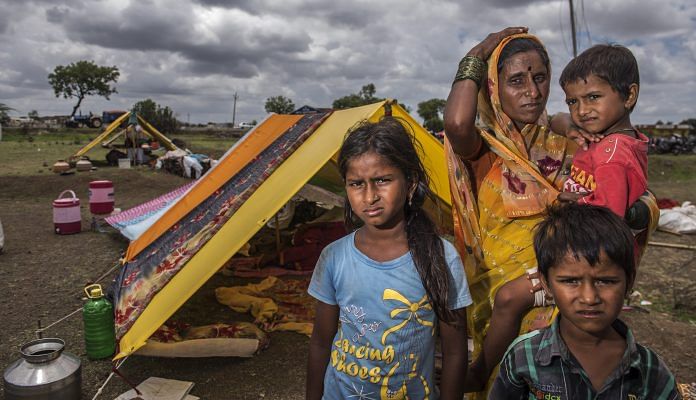Nathpanthi Davari Gosavis, who bless weddings and pujas, are believed to have been recognised as ‘revered singers of folklore’ by a commander of Shivaji.
Mumbai: The five people lynched Sunday over a viral WhatsApp rumour about child-lifters belonged to a nomadic tribe that has historically commanded high respect with affluent Maratha households, including emperors.
Members of the Nathpanthi Davari Gosavi community are called to bless pious occasions such as weddings and pujas.
The tribe travels far and wide, from one village to another, in search of bhiksha, alms offered not out of pity, but respect, be it money, rice, wheat or pulses.
The WhatsApp rumour, which has triggered lynchings across the country, talks about the entry of child-lifters in a given area, thus rendering a nomadic community like the Nathpanthi Davari Gosavi particularly vulnerable.
Some travel in different costumes singing about folklore, while others practise the state’s religious traditions, performing gondhal, a religious folk art, on happy religious occasions. Still others rear cattle outside temples.

“Everyone knows that the gondhalis are from the Davari samaj. We are given god-like treatment. Even today, Maratha families such as the Patils, Deshmukhs, Sawants and others call our members gondhalis. We get a lot of respect,” says 37-year-old Kumar Shegar who belongs to the community.
“The Dhule incident was the first time our people were beaten up so outrageously and killed,” he says.
‘A peace-loving community’
Shegar, who is now settled in Mumbai and works as a driver with the State Bank of India, says the community has not been involved in any “untoward incidents”.
“When our people go to different villages, locals do ask questions about our identity, who we are, what are intentions are,” says Shegar. “At some places, we have to report to the local sarpanch and police station too. But people know us as a peace-loving community. We have never been involved in any untoward incidents.”
The community dates their history back more than five centuries, when members, worshippers of Kalbhairavnath travelled across the country spreading religious teachings.
Since they have always been nomads, they do not belong to any one place. Many community members, however, have now settled across the country in Maharashtra, Karnataka, Uttar Pradesh, Rajasthan and Madhya Pradesh.
In Maharashtra, it is said that Bahirji Naik, a military commander of the Maratha warrior king Chhatrapati Shivaji, established a status for the Nathpanthi Davari Gosavi community in the emperor’s kingdom as ‘revered singers of folklore’.
The community currently has a population of about 10 lakh in Maharashtra.
While many still live the traditional life of a nomad, with time, some younger educated members of the tribe have moved to cities like Mumbai and Pune for employment.
“About 10 per cent of the people in our community are now qualified professionals such as doctors, teachers, engineers, lawyers and so on,” says 52-year-old Bharat Chaugule, whose parents settled down in Hunnur, a village in Solapur district’s Mangalwedha taluka.
Four of the five men killed in Dhule hailed from Mangalwedha taluka. Chaugule moved to Mumbai in 1988 and is now a government employee.
Chaugule and Shegar work as part of a small city-based organisation, ‘Jaga Ho Nathpanthi (Wake up, Nathpanthis)’, which seeks to unite members of the tribe across the state to work for the social welfare of their community.
They have been reaching out to more members of their tribe and like-minded organisations to approach the state government to demand justice for the Dhule victims.
‘On the fringes’
Members of the community say the Dhule victims may never have met the fate they did had they been paid more attention by the administration.
The community, they allege, faces a lot of problems. The reach of education within the community is poor, and many members still earn their living through alms. Since they are scattered across the state and disorganised, they also lack political representation.
“Our community has not even been able to get the fruit of reservations. Getting a caste certificate is a major issue. Also, in many places where members of our community have settled, the government sees us as encroachers,” says 27-year-old Bapu Abhimanyu Chavan, who lives in Sinnar, Nashik.
Chavan, who works as a transporter in the state’s local industrial estate, says the blame for incidents like Dhule lie entirely with the government.
“The government didn’t look at us. They wanted us to remain marginalised. If the government had helped us, members of our tribe wouldn’t have had to still roam around in far off villages to seek alms and earn a living,” says Chavan.




l like draw attention to ThePrint here, last month in kerela there was a bandh call by a selective terror linked group well planned & executed which neither police, administrators, lawmakers and general public got any clue what so ever. Common people had to face the brunt & losses. Hence it is very
Important to analyse them pro/con aspects, before we jump into our conclusions at least in digital messaging